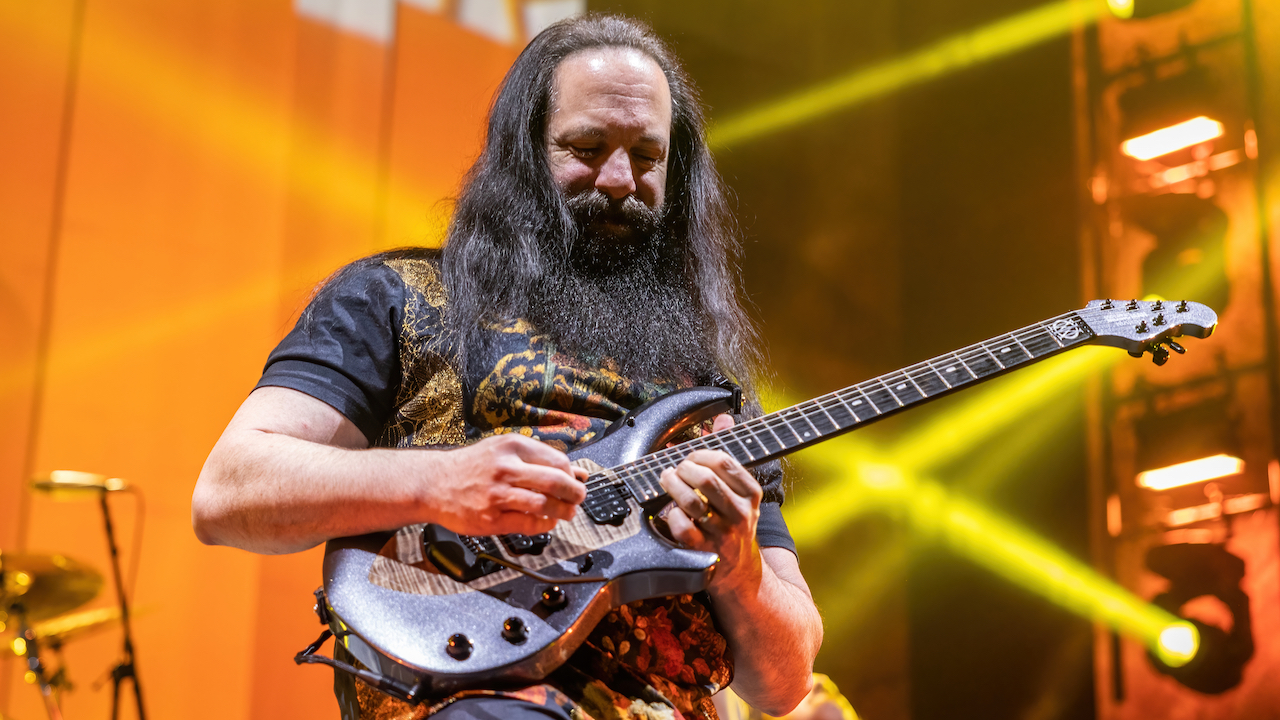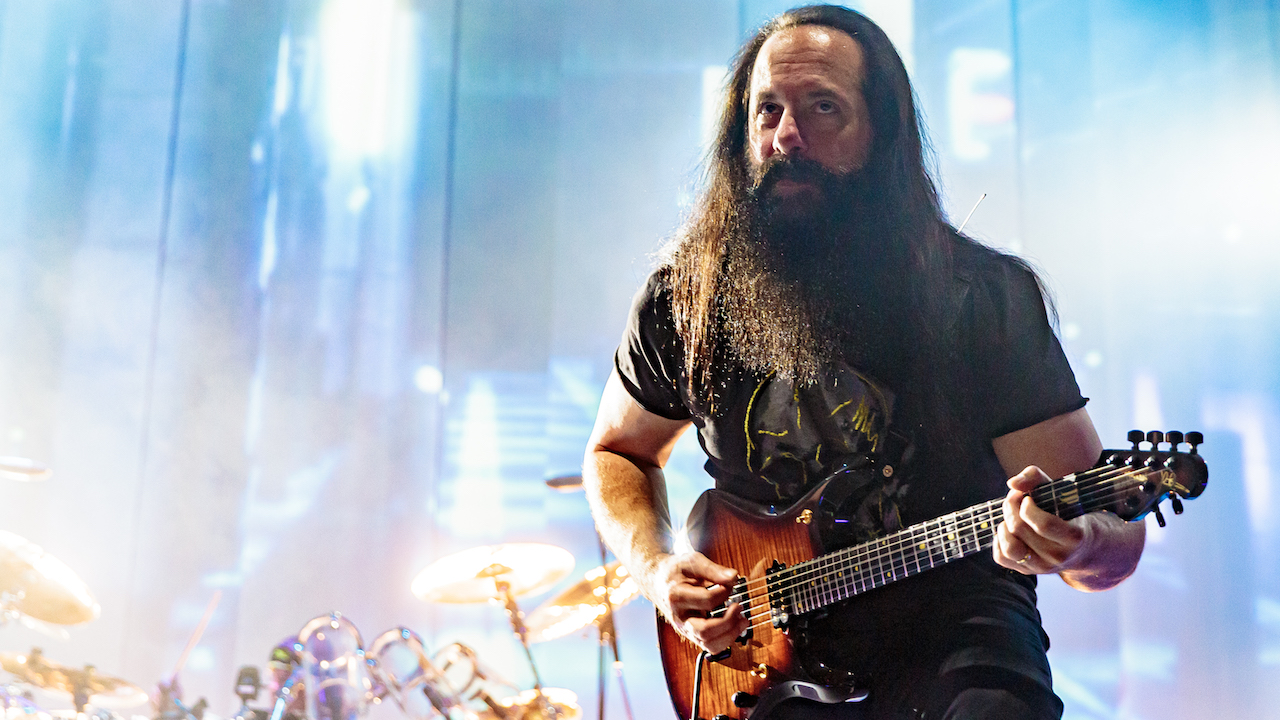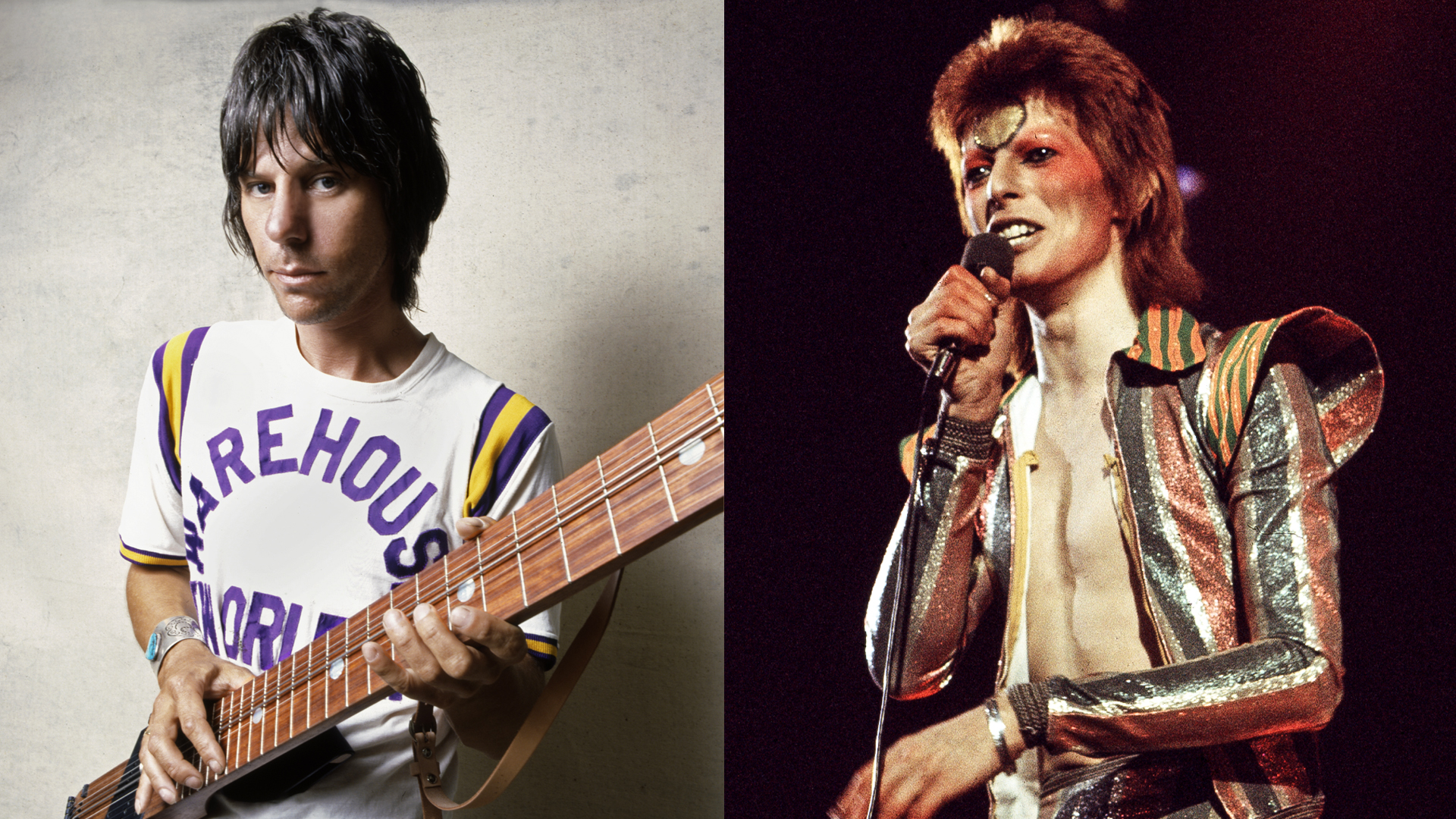“The worst thing you can do is beat yourself up when you make a mistake…” John Petrucci’s top five tips for guitarists

Over the course of his nearly 40-year career, Dream Theater guitar god John Petrucci has played thousands of shows across the globe. And guess what? Not all of them have been perfect. “Oh, yes, I’m mortal,” he says with a laugh. “Even though I try to nail all of my parts night after night, I’m going to screw up occasionally. It happens.”
How does Petrucci not allow onstage flubs to bother him? By simply choosing not to get rattled. “The worst thing you can do is beat yourself up when you make a mistake,” he says. “If you start to become too self-conscious, you’ll get in a downward spiral and you’ll make another mistake. Before you know it, you’ve made a string of mistakes and your whole gig will be a disaster, all because you chose to dwell on one little screw-up that probably nobody else even noticed.
“Things go by so fast — a lot of people never catch that error you made. On the other hand, if you blatantly call attention to yourself, believe me, people will notice.”
He admits that it used to be easier to shrug off onstage goofs. “In the days before cell phones and the internet, if you messed up something onstage, it was over and you could just move on,” he says.
“Now, whenever I’ve got a really difficult part to play, I’ll catch a glimpse of the audience and there’s hundreds of phones pointed at me. Everybody’s filming me, and I know that video is going to go online for hundreds of thousands of people to see. That can mess with your head, if you let it.”
At that split second when he might freeze, Petrucci distracts himself by focusing on something else. He’ll look at his bandmates, or gaze out over the heads of his audience and stare toward the back of the venue. Sometimes he’ll spot somebody in the crowd — a kid air guitaring, totally lost in the music — and, just like that, he snaps out of it.
“You can’t stay absorbed in your own thoughts when you see people so excited by what you’re doing,” he says. “That’s the moment when you realize, This is why we’re here.”
All the latest guitar news, interviews, lessons, reviews, deals and more, direct to your inbox!
These days, Petrucci tries to live by a motto he adopted from Neal Schon: “I try not to suck.” “Neal said that to me and my wife, Rena, one night when we were at a Journey show,” he recalls. “We complimented him on his playing, and that’s what he said. I was like, You know what? That really sums it up. That’s all any of us can do.”

IMAGINE YOU’RE IN THE AUDIENCE
“Playing gigs can be challenging. There’s a lot that transpires in your life, leading up to the moments when you walk onstage. Some days everything is going right for you, and you hit the stage on top of the world. Other times, things aren’t so good. Maybe you’re tired or sick. Maybe you ate a bad burrito.
“But guess what? Those are your problems — you can’t take them out on your audience. This is a night of entertainment for them. They came out to hear you play music, and you owe them what they paid for. It’s not a one-sided exchange.
“This is certainly true when you get to a high level and you’re playing big places. People probably went to a lot of trouble and expense to come to your show. But even if you’re playing clubs, you still have to adopt the mindset that the audience deserves your best.
I'll do a very light workout: maybe 15 minutes before the gig. I have to credit Joe Satriani with that
“Try to imagine that you’re in the audience and you’re watching you. What do you see? Are you seeing somebody who respects them and is giving them a great performance? Or are you seeing somebody who’s self-absorbed and has forgotten what this is all about?
“My thought process before going onstage is to remember the people who are in the audience — and why they’re there. I respect them and value them, and I owe them a great experience.”
MAKE SURE YOU’VE REHEARSED
“The kind of music I play onstage requires me to be on my game technically. When I’m on tour, I tend to treat my days like I’m going to the gym. I put in the time and I train. The way you focus on certain physical exercises when you’re at the gym? That’s what I do on the guitar.
“I look at parts of the show that are more difficult than others, and I spend time practicing those parts. I don’t really go over the stuff that I know by heart; rather, I bear down and work on the stuff that isn’t so easy. And I don’t practice anything else — I only work on what I need to play onstage.
“A lot of time on the road, I’ll have a good hour or so to rehearse. Other times, I might have just 15 minutes. If that’s the case, I try to make the most of my time so that when I hit the stage, I’ve gone over the tricky parts and I feel like I can play them well.
“My routine changes when I go home and I have periods of time when I don’t have to think about a show. That’s when I can work on other things and develop my chops in other ways. But when I’m in tour mode, I make sure I’m super rehearsed for what I have to play at night.”
WATCH WHAT YOU DO OFFSTAGE
“When I’m on tour, I try to think twice before engaging in certain recreational activities that might affect my playing. Even if it’s something like bowling, which I don’t do too often. But even then, I fast-forward to being onstage and having a sore wrist or a sprained finger or something. I have to consider if that hour of leisure time is worth the risk of something going wrong, and if I’ll be kicking myself for weeks afterward.
“This kind of thing happens on tour: Your buddies want to go out hiking on a day off. Sounds great, right? But what if I’m onstage the next day and my legs are killing me? I know it sounds funny, but this is the kind of thing I have to think about.
“Again, when you’re playing shows — at whatever level you’re at — you have a responsibility to be at your best. Take drinking, for example: You might not be thinking about your gig when you’re out at a restaurant enjoying your third Old Fashioned. The next thing you know, you’re onstage and your brain is foggy — you certainly won’t play a good show in that condition.
“Mentally and physically, you should try to avoid drinking when you have to play shows. I know our singer, James [LaBrie], won’t drink when we’re on tour — not a drop. He waits till we’re off the road and he can have some Guinness.”
WARM UP: BUT NOT TOO MUCH
“I’ve gone through trial and error when it comes to warming up before I show. I’ve done that thing where I practiced for two hours and thought I was oiled up, and then I walked onstage and my hands were fatigued. As soon as I played that first chord, I was like, Damn it, why did I do that? My hands were burned out, and the whole show was a struggle.
“There are guys who won’t even touch a guitar before they play a show. They have this attitude of ‘I want to be fresh.’ I’ve tried that approach, but I think a certain amount of blood flow is needed before I play.
“Over time, I figured out that the best way for me to warm up is to do it earlier in the day. I’ll go through all the difficult stuff I need to work on, but I’ll leave enough space between practicing and the show itself. That way, I’ve got everything down, but I haven’t left my whole game in the dressing room. You want to have some gas in the tank.
“If I do any playing right before a show, I’ll do a very light workout — maybe 15 minutes before the gig. I have to credit Joe Satriani with that. I saw him do that kind of thing on a G3 tour, and I thought, That seems to work for him. I’ll try that.”
TRY TO RELAX
“Okay, you’ve rehearsed your material. You’ve picked out your stage clothes and dieted so you can get in your pants. Your beard is washed and trimmed. All the pieces are in place. The only problem is, you can’t calm down. Trust me — nerves and anxiety are not your friends when it comes to playing live music. Whatever you can do, try to get into a relaxed headspace before you perform.
“There are things that I generally try to do so that I’m relaxed before I go onstage. Probably the most important thing is loosening up my muscles as if I’m about to do some sort of athletic activity. I’ll do some stretches and shake out my arms, and I’ll do some breathing exercises. It really works.
“I know some performers do the opposite — they’ll do pull-ups and push-ups like they’re getting ready for a football game. We did a tour with Animals as Leaders, and those guys traveled with weightlifting equipment. Some of them would exercise like mad right before they went onstage. I was like, ‘I don’t know how you do that.’
“I’ve tried working out before a show, but I found that it created more tension in my arms. Plus, it increased my heart rate, which is the opposite of what I wanted. I want to feel loose and fluid. I try to think about my nervous system and how I’m going to feel onstage.
“Some people drink coffee or espresso before I gig. I’ll do that sometimes, but I try to time it right so that I’m alert but not jittery. If I’ve got a cold, which happens on tour, I won’t take a decongestant before a show — that will definitely freak out my nerves. Everybody is different, so try things and see what works for you. But the point is to relax as best you can.”
Dream Theater’s latest album A View From The Top Of The World is available to buy and stream now

Joe is a freelance journalist who has, over the past few decades, interviewed hundreds of guitarists for Guitar World, Guitar Player, MusicRadar and Classic Rock. He is also a former editor of Guitar World, contributing writer for Guitar Aficionado and VP of A&R for Island Records. He’s an enthusiastic guitarist, but he’s nowhere near the likes of the people he interviews. Surprisingly, his skills are more suited to the drums. If you need a drummer for your Beatles tribute band, look him up.
